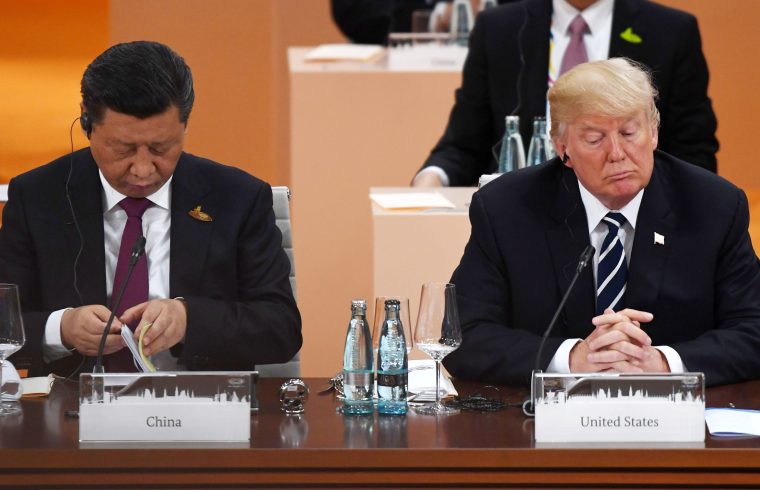
The relationship between the U.S. and China may continue to worsen after the State Department ordered Beijing to close a consulate in Houston, making it “almost certain” the Asian country will retaliate, experts said on Thursday.
U.S. officials said the move was made to protect American intellectual property and “private information.”
The dramatic event on Wednesday came after recent tumultuous developments between the world’s two largest economies. On Tuesday, the Justice Department claimed that two Chinese citizens had tried to steal trade secrets by hacking into firms working on a vaccine for Covid-19.
The FBI also alleges that a researcher focusing on biology who lied about her connection to the Chinese military in order to receive a U.S. visa has avoided arrest by taking refuge in the Chinese consulate in San Francisco, according to a July 20 court filing.
Domestic politics in the U.S. ahead of the presidential election in November could have played a part in the closure order, said Orville Schell, Arthur Ross director of the Center on U.S.-China Relations at the Asia Society.
“The president is bent on blaming China — and not without some justification — for the virus, but I think the failure of the United States to be able to bring the virus under control has meant that he does wants to emphasize its source, namely China,” said Schell.
“This is where our foreign policies then get interlocked with domestic issues, namely the elections. So, that is alarming,” Schell added.
But there are still ample reasons for the U.S. to seek a more balanced, reciprocal and equitable relationship with China in many areas such as trade and intellectual property, issues other countries also have with Beijing, said Schell.
How the rhetoric and narrative surrounding U.S.-China relations evolve will depend on who the American president will be a year from now, said Robert Daly, director of the Wilson Center’s Kissinger Institute on China and the United States.
But “it’s almost certain China will retaliate” for the U.S. move against its consulate in Houston, which is “the beginning of a dramatic escalation in tension” and is more serious than retaliatory journalist expulsions, said Daly.
Schell said the closure order is one that “gets us a giant step closer to at least the withdrawal of ambassadors” or something similar.
Both Schell and Daly said Beijing could order the closure of the American consulate in Wuhan in retaliation. They noted, however, the Wuhan consulate is a smaller outfit that has largely been largely inactive since the repatriation of staff earlier this year due to the pandemic.
If Beijing wanted to escalate the issue far more, it could order the closure of the American consulate in Hong Kong, said Schell.
Hu Xijin, editor-in-chief of the state-run Global Times, also suggested that China could target the consulate in the financial hub, saying “Even if China doesn’t close it, it could instead cut its staff to one or two hundreds. This will make Washington suffer much pain.”
The U.S. consulate in Chengdu could be another target for retaliation, the South China Morning Post reported citing a person briefed on the decision.
But it’s hard to predict how far U.S. President Donald Trump and Chinese President Xi Jinping would go with this, said Daly.
Both presidents seem “unwilling and inflexible” in making concessions, with Xi especially who identifies yielding as a sign of weakness, said Schell. He explained this denies him the flexibility that diplomats need to head off a “spiraling situation” like this one.
“That is the heart and soul of diplomacy — you give a little and you get a little,” Schell.
A global alliance against China is unlikely
Even though various countries around the world have concerns about China’s illiberal practices, many are unlikely to join an overt alliance against the East Asia powerhouse, said Daly.
On Tuesday, U.S. Secretary of State Mike Pompeo reportedly urged the U.K. to join a “broad alliance” against China, the Financial Times reported.
That may not happen.
“This business that they would join in an overt alliance aimed at China, this is a position that other countries including U.K. don’t want to be put in. They are hoping for something more nuanced than that,” said Daly.
China’s widening rift with the U.S. may also pull Beijing and Moscow closer.
“Clearly, the relatively clear, assertive policies of the Trump administration do tend to push Russia and China — which are already in a sort of entente — closer together and increases their interest in forming a bloc which stands against aspects of the United States’ global leadership,” said Daly.
Changing narrative of China’s role
The current developments play into a narrative that has shifted from China as a changing, reforming, developing and rising power — a generally positive development despite some threats — to one that focuses on a “bad China.”
In that narrative, there is a sense “that China is a bad actor internationally” and that if the Chinese Communist Party is trying to implement and legitimize those “illegitimate” policies internationally, “this is a country with which the United States and other countries cannot deal (with),” said Daly. He said, however, that he thinks this is overstated and dangerous.
— CNBC’s Kif Leswing and Sam Meredith contributed to this report.



